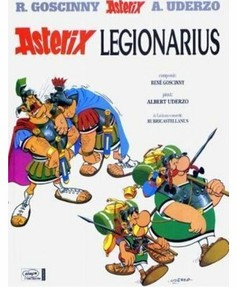 Asterix has been translated into more than 100 languages. The original books were written in French and have been translated into English.
Asterix has been translated into more than 100 languages. The original books were written in French and have been translated into English.
The majority of Asterix books have also been translated into Basque, Brazilian Portuguese, Bulgarian, Catalan, Croation, Czech, Danish, Dutch, Estonian, Finnish, Galician, German, Greek (Modern), Hungarian, Icelandic, Italian, Latin, Latvian, Norwegian, Polish, Portuguese, Romanian, Serbian, Slovene, Spanish, Swedish, Turkish and Welsh.
A smaller number have also been translated into Afrikaans, Arabic, Bengali, Esperanto, Frisian, Greek (Ancient), Hebrew, Hindu, Indonesian, Japanese, Korean, Mandarin, Persian, Romansch, Singhalese, Scots Gaelic and Vietnamese.
In a few countries such as France, Greece, Italy and Germany some of the books have even been translated into regional languages (dialects), such as Corsican and Bavarian.


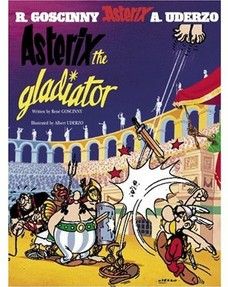

 Asterix has been translated into more than 100 languages. The original books were written in French and have been translated into English.
Asterix has been translated into more than 100 languages. The original books were written in French and have been translated into English.
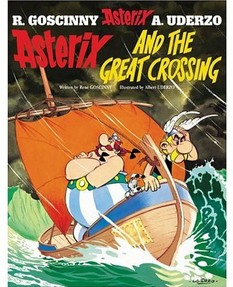 These early 1970s Asterix books were the last to be written together by Uderzo and Goscinny. As a result they are probably the last of the Asterix titles to have a consistency high standard.
These early 1970s Asterix books were the last to be written together by Uderzo and Goscinny. As a result they are probably the last of the Asterix titles to have a consistency high standard. 
 Goscinny died in 1977, the year after Obelix and Co was published. After Goscinny's death Uderzo adding writing the series (in addition to illustrating them) to his tasks to keep up the publication of new Asterix books. Between 1977 and 1979 only one Asterix book was written
Goscinny died in 1977, the year after Obelix and Co was published. After Goscinny's death Uderzo adding writing the series (in addition to illustrating them) to his tasks to keep up the publication of new Asterix books. Between 1977 and 1979 only one Asterix book was written 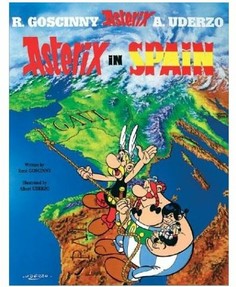 The Asterix books have a fairly advanced reading level so they are usually not suitable for children under 9 or 10 years of age, although some of the books would be fine as a read aloud story.
The Asterix books have a fairly advanced reading level so they are usually not suitable for children under 9 or 10 years of age, although some of the books would be fine as a read aloud story.

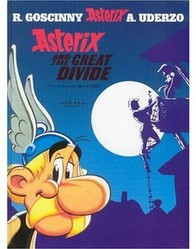

 Monkey Birthday Party Favorson 01/24/2013
Monkey Birthday Party Favorson 01/24/2013
 Butterfly Birthday Party Favorson 02/02/2013
Butterfly Birthday Party Favorson 02/02/2013
 Monster High Birthday Party Favorson 01/24/2013
Monster High Birthday Party Favorson 01/24/2013
 Basketball Party Favors for Girlson 01/30/2013
Basketball Party Favors for Girlson 01/30/2013

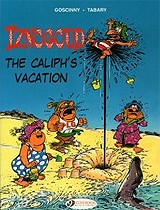

Comments
Oh gosh what a shame about your Asterix. I had to restock my collection because when my older brother moved out he took all the Asterix with him. I did forgive him tho :) I've never read Lucky Luke. You've made me curious. I'll have to track one down to read.
Wow, amazing article! I haven't read these comics since... long long time ago... But they were my favorite. I had the whole collection published in Serbian language (I think there were 27 books). Back then (late 90s in Serbia) they cost fortune so I kept them as some kind of treasure... Unfortunately, when I grew up, my parents put all the comics in a basement where humidity ruined them... Lucky Luke was also amazing. I think it's written by the author of Asterix!
Oh boy I had forgotten about Boneywasawarriorwayayix LOL
Asterix is great. Boneywasawarriorwayayix from Asterix in Corsica was my favourite character just because of his ridiculous name.
Gosh that sounds brilliant Sam :D
When we went to Corsica for holidays, we actually bought Asterix on Corsica, it was great fun reading and comparing it to the Corsica we saw around as ;-)
I've come across people from so many countries who love Asterix. The series is a true classic :)
My all-time favorite comics! I devoured them as a German youngster in the 60s.
Grrrrreat articulus!